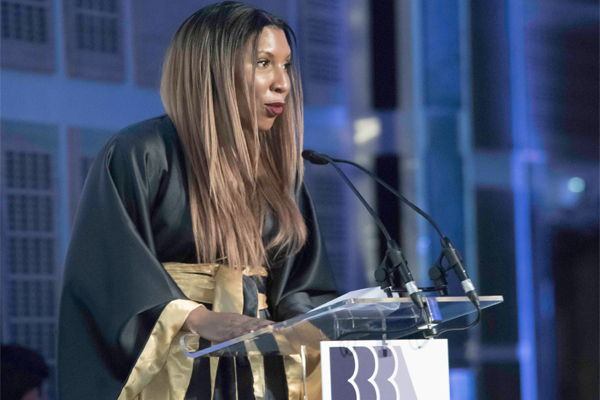The Black British Business Awards’ (BBBAwards) Melanie Eusebe has smashed through steel ceilings both in the entrepreneurial and corporate world. In this interview, she shares her experience with Fair Play Talks’ Pepi Sappal about the challenges that she faced on her rise to the top, not only as a woman, but a Black woman of Caribbean heritage, and why allyship and sponsorship have been key to her success. She also provides invaluable advice for organisations, as well as women and individuals from ethnic minority backgrounds.
Profiled as one of the most influential women in the UK’s business world, Melanie Eusebe, is well-known for having co-founded the BBBAwards that “shine a light on amazing black talent”.
Eusebe has worked for some of the leading global business organisation, such as TD Bank, IBM and EY, in both Canada during the early years of her career and more recently in the UK before she left the corporate world to set up the BBBAwards with Morgan Stanley’s COO Sophie Chandauka. As well as running the awards, Eusebe recently returned to the corporate world as Director, Strategy and Consulting at Accenture, thanks to the entrepreneurial experience she has gained in recent years.

SPONSORSHIP & ALLYSHIP IS KEY
Like many Black women and people of colour, Eusebe admits that she left the corporate world during the height of her career, often referred to as the ‘drop off’ point. “I was busting through steel ceilings in the early stage of my career, but I got to a point when things started to get really tough. The main challenge on the way to the top was not knowing how to play the game; and not having enough sponsors and allies to reach those top leadership positions,” she recalls.
Although she had plenty of mentors, “who generally provide one-to-one guidance and advice to help you advance in your career, that alone is not enough”, Eusebe explains. “You need sponsorship too. That’s when leaders advocate for you when you’re not in the room. Basically they use their platform, privilege and access to get you into places or in front of people that you might not on your own.”
OVER MENTORED & UNDER SPONSORED
Eusebe believes that “Black people in particular are over mentored and under sponsored. Yet that’s the support and allyship that organisations and leaders need to provide if they want to retain both minorities and women in their leadership pipelines”. In fact, ‘sponsorship’ from a key business leader helped her secure her current role at Accenture.
“I was having a conversation about advancing Black and Asian talent with a headhunter, when he mentioned that David Tyler, the former chairman of Sainsbury’s recommended me for a position. By doing that David, who is a big fan of the BBBAwards, brought me into the conversation for an opportunity even though I was not in the room. By doing that, not only was he vouching for me, but he was lending me his power, privilege and access to open doors for me. That’s what sponsoring is,” points out Eusebe.

THE BIRTH OF THE BBBAWARDS
Sponsorship and guidance from Karen Gill and Maxine Benson, Co-founders of everywoman, which provides a range of products, services and awards to support the advancement of women in business, also resulted in the birth and success of the BBBAwards, tells Eusebe. “When I told them about my idea of launching an awards event to shine a light on amazing Black Talent, like they did for women in business, not only did they introduce me to Sophie [BBBAwards’ other Co-founder], but they also mentored us on everything from how to set up the awards and nominations to the celebratory event.”
Back then many people asked her, “Why are you launching this with two White women?”, recalls Eusebe. Her response: “It’s thanks to their sponsorship and allyship, their introductions to sponsors, and so much more, that has helped to open up the narrative and promote underrepresented Black talent in the world of business. In short, we were accelerated by them. Not only did they help to found the BBBAwards, but Sophie and I couldn’t have achieved what we have today without them. And we are still great friends and partners today.”
INVALUABLE ALLIES
“It was also thanks to Audrey Campbell, who was heading up diversity and inclusion at EY, while I was still working there, who provided the funding and sponsorship for the first two years. That enabled me to leave my EY role and focus on the BBBAwards. I really could not have done it without her either,” she adds.
That was back in 2014. However, what started out as mainly an awards ceremony, turned into much more by year two. “Although we started off as an awards ceremony to shine a light on Black talent, by the second year we were clearly launching into solutions for impact and legacy. Since then we have been helping large organisations with their diversity inclusion strategies. We are now offering corporate programmes, such as Talent Accelerator to Black and other minority groups, like Asians, in the UK. We have also launched the Boardroom Programme in association with Deloitte; Mentor Mondays which focuses on people who have just joined the workforce to help them think about their careers more strategically; and the Enterprise Academy for minority entrepreneurs,” highlights Eusebe.

BAME & THE MESSY MIDDLE ‘DROP OFF’ POINT
So what advice does she have for organisations to help them retain Black, Asian and other ethnic minority talent? “First acknowledge that there is a ‘drop off point’ that leaders need to be aware of. If organisations are successful in recruiting Black, Asian or ethnic minority talent, but failing to retain them, then there’s obviously something wrong with the culture,” points out Eusebe. “Having published the Middle Report which explores the minority ‘drop off point’ problem, we confirmed that companies need to get to grips with this ‘messy middle’ if they want to retain Black, Asian and ethnic minority staff, after they reach middle management levels.”
Eusebe believes acronyms like BAME (Black, Asian and Minority Ethnic) haven’t helped: “It’s extremely problematic; and in part explains why race hasn’t been addressed properly in the first place. When I started to work in the UK a few years ago, minorities in the UK were – and still are – referred to as Black or Asian. Coming from Canada, I did not get it. Asia is a huge continent. So when people referred to Asians, I automatically asked, which race exactly are we talking about? Thai, Viatnemese, Indian, etc?
It’s the same when describing someone as Black, she says. “It can mean someone from the Caribbean like Jamaica, an African-American from the US, or someone from Africa, etc. And again Africa is another huge and diverse continent. Therefore language and acronyms like BAME presents a huge barrier. So we have to open up and change the language and narrative; particularly around ethnicity, so that people are more comfortable talking about race at work.”
DIVERSITY AND INCLUSION
Secondly, she believes that for too long “the diversity and inclusion agenda (D&I) has been centred on gender at the expense of all other diversity spectrums. Because of that, it has allowed companies to say we are successful at D&I just because they are successful at gender inclusion. That’s a problem – just because you have addressed gender does not mean that you have addressed all the other diversity spectrums”.
“Thirdly we know what gets measured gets done,” she adds. “But many companies still don’t have basic data, such as who’s joining, who’s left, who’s happy, etc. That makes it difficult to set targets and goals. We need quantitative and qualitative data. For example, when companies talk about the lack of diversity in their senior ranks, I actually say: ‘Have you asked your Black and Asian employees if they feel this firm is one where they can progress?'”
WHY LEADERSHIP LACK DIVERSITY
Many companies reply by saying ‘oh we need critical mass to do that’. So I usually say, ‘You only have a handful. It’s not that hard’. So it’s exasperating to hear companies making statements about wanting to be better at D&I, yet they fail to ask staff simple questions like: ‘Are you ok? Is this a place where you feel you have the opportunity to thrive and grow? Are you having any experiences that trouble you or that we should know about to prevent it from happening to you or someone else?’”
These are all questions firms need to be asking. “The data part (quantitative and qualitative) is key to start addressing some of these issues,” stresses Eusebe. “Of course many companies aren’t. So it’s not surprising that they aren’t retaining the few minority staff they may have, especially in the higher management/leadership ranks.”.

THE POWER OF NETWORKING
What about advice for individuals, particularly those stuck in the middle and struggling to achieve those leadership positions? “In short, make a goal and go for it. Think about your career strategically. Don’t just think about the content and execution of the role. Think about where you want to go. Find examples – not just mentors, but role models too who have been successful in achieving what they wanted to. Figure out what they did to get there,” advises Eusebe. “Be empowered to work towards what you want and your destiny. It’s a good time right now. Because we are in a pandemic, you are probably spending less time on commuting. So use that time on strategy/upskilling etc.”
Networking is also “key”, adds Eusebe. “Even if it’s just reaffirming and re-establishing your existing networks right now; do it because it’s also about how you navigate the system through your connections to achieve your goals. So ensure you have a network that can guide and inspire you, as well as provide the sponsorship and allyship you need to get ahead.”
It certainly played a big part in helping to accelerate Eusebe to her current position – both at the BBBAwards and Accenture.
For more information on the next BBBAwards, or the many invaluable programmes/services it offers to help fast track minority talent into leadership, click here.







































